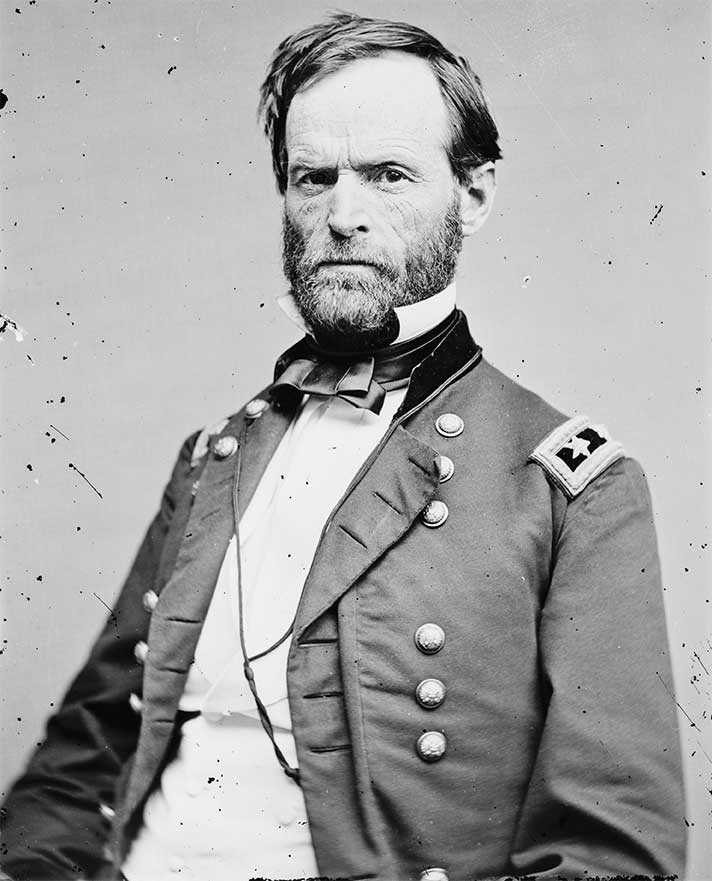
|
|
VITAL STATISTICS
|
BORN: 1820 in Lancaster, OH
DIED: 1891 in New York City
CAMPAIGNS: First Bull Run, Shiloh, Corinth, Memphis, Chickasaw Bluffs, Arkansas Post, Operations leading to the surrender of Vicksburg, Chattanooga, Atlanta, Resaca, March to the Sea, Carolinas.
HIGHEST RANK ACHIEVED: Maor General.
|
|
BIOGRAPHY
|
| William Tecumseh Sherman was born in Lancaster, Ohio, on February 8, 1820. His father was a lawyer and jurist, but died suddenly in 1829, leaving behind 11 children. Young William was sent to be reared by Thomas Ewing, US Senator and Cabinet member. Sherman received his early education in Ohio, then was appointed to the US Military Academy at West Point, graduating in 1840. He served in Florida and at Fort Moultrie, South Carolina, then took his first leave in 1843. At that time, he returned to Lancaster, Ohio and became engaged to Ellen Ewing, the daughter of his foster parents. Upon his returned to South Carolina, he toured the states of the South and inspected the federal arsenal at Augusta, Georgia in 1845. Sherman served in the Mexican War, and became adjutant general to Gen. Persifor Frazer Smith. In 1850, while on a trip to carry dispatches for Gen. Winfield Scott, Sherman married his fiancée in Washington, D. C. After three years, Sherman resigned his commission and moved to San Francisco to work as the local agent for a banking firm. While he managed the company's funds well through the financial crisis of 1857, the bank failed. Sherman moved to Fort Leavenworth, Kansas and opened a law and real-estate office. In 1859, he became superintendent of the Louisiana State Seminary of Learning and Military Academy near Alexandria, Louisiana, which later became Louisiana State University. When Louisiana seceded from the Union in 1861, Sherman was offered a commission in the Confederate army, which he declined. Instead, he became president of a St. Louis streetcar company. After the fighting at Fort Sumter, however, Sherman returned to the military, appointed colonel in the 13th Infantry. Placed in command of a brigade, he led troops at the First Battle of Bull Run, where the Union was defeated. Promoted to brigadier general of volunteers to date from May 17, 1861, he served in Kentucky under Brig. Gen. Robert Anderson, then took over command when Anderson became ill. Sherman began his negative relationship with the press when his explosion of temper at his untrained troops was reported as a sign of a mental breakdown caused by too much responsibility. The War Department reassigned him, placing him in command of the District of Cairo. While his brigade was routed at Shiloh, Sherman fought well at Shiloh and in the advance to Corinth, and was promoted to major general of volunteers to rank from May 1, 1862. When Ulysses S. Grant became commander of the Western armies in the summer of 1862, he sent Sherman to maintain the defense of Memphis, Tennessee. Sherman was highly successful in suppressing guerilla attacks there, and in setting up a strong civil authority. In December of 1862, Grant sent Sherman to Chickasaw Bluffs; where Sherman was defeated and gave command of the forces to Maj. Gen. John A. McClernand. McClernand organized the troops into the Army of the Mississippi, and gave Sherman command of one of the two corps. The troops were successful against Arkansas Post. Later, as part of the Army of the Tennessee, Sherman led a corps and took part in the operations that led to the surrender of Vicksburg on July 4, 1863. He returned to Memphis in September of 1863, and helped relieve Chattanooga. Placed in command of the Army of the Tennessee, Sherman launched the Atlanta Campaign, which he ended victoriously. He was promoted to major general in the Regular Army, to rank from August 12, 1864. Sherman had the civilian population of Atlanta evacuated, then destroyed its military resources and moved across Georgia on the famous "March to the Sea." Vast amounts of property were destroyed, causing the alienation of many Southerners. Sherman contended, however, that the bold destruction of property to end the war was better than the continual loss of human life the war was perpetuating. He is held to be one of the first modern military leaders for this philosophy, and he was awarded a Thanks of Congress twice. Sherman and Confederate Gen. Joseph E. Johnston ended the Carolinas Campaign of 1865 in April, when they discussed surrender terms eight days after Confederate Gen. Robert E. Lee's surrender at Appomattox. After the Civil War, Sherman commanded the Division of the Mississippi, provided military assistance for the construction of the transcontinental railroad and fought against Native Americans. He was promoted to lieutenant general when Grant became full general, in July of 1866, and moved to Washington to take command of the army temporarily. When Grant became President in 1869, Sherman became a full general, and general-in-chief of the army. His "Memoirs of General William T. Sherman" were published in a two-volume edition in 1875. Retiring in November of 1883, Sherman settled in New York City in 1886, and died there on February 14, 1891. |
|

